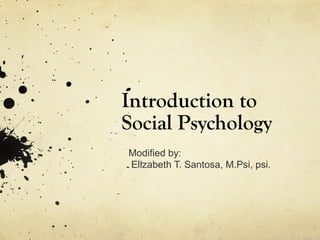
Introduction to the Key Concepts of Social Psychology
- 1. Introduction to Social Psychology Modified by: Elizabeth T. Santosa, M.Psi, psi.
- 2. Introduction When we talked about personality we talked about similarities in behaviour between and within individuals Most social psychologists don’t dispute these individual differences but they realize the importance of the situation
- 3. Introduction Social psychologists are concerned with how we explains others’ behaviour and how others’ behaviour affects us May be as important as the individual
- 4. Characterizing Social Psychology Social Psychology The scientific study of the feelings, thoughts, and behaviors of individuals in social situations Explaining Behavior • What social psychologists study: - how people are influenced by others - how people make decisions - inferences we make about others attitudes & personalities - influence of situational variables on behavior - how we make sense of our world
- 5. Characterizing Social Psychology Comparing Social Psychology to Related Disciplines a. Personality psychology - stresses individual differences in behavior b. Cognitive psychology - study of how people think about, perceive, and remember aspects of the world c. Sociology - study of behavior of people in the aggregate (population level issues)
- 6. Attribution Theory Fritz Hieder (1958) Attribution is a concept in social psychology addressing the processes by which individuals explain the causes of behavior and events. Heider subsequently extended his ideas to the question of how people perceive each other, and in particular how they account for each other's behaviour, person perception. Three important roles in someone behavior is motives, intentions, sentiments.
- 7. Attribution Theory Two types of attribution: 1. Explanatory attribution to understand the information; to find cause-effect of a situation ex: Your grandmother got tripped on the street and hospitalized; by making attribution too poor condition of the road. What if in reality because of her cataract and unclear vision? 2. Interpersonal attribution two or more individuals ex: A and B have arguments. A said she try to avoid, B started. Others think that B provokes the arguments, while A is victim
- 8. Attribution Theory Two categories of attribution to explains human behavior: 1. Locus of control Internal (personal) : ability, personality, mood, efforts, attitudes, or disposition 2. Locus of control external (situational) attributions : task, other people, or luck.
- 9. Attribution Theory We tend perceive ourselves as GOOD. so when we do something we often blame the situation Attributions have negative effect When we blame a person or the situation, we often generalize it to next coming event that similar.
- 10. Attitude Can we change the way people think? Attitude is an expression of favor or disfavor toward a person, place, thing, or event (the attitude object). How to measure Attitude? Self-report Bipolar scales: (good-bad, favorable-nonfavorable, etc) Open ended q’s : “ i feel...” Likert scales
- 11. Attitude Change Factors that affect persuasion (process of guiding oneself or another toward the adoption of some attitude by some rational or symbolic means) 1. Target Characteristics Intelligence Self-esteem (high – moderate- low) Mood 2. Source Characteristics Expertise, trustworthiness. ex: Journal vs magazine Interpersonal attraction “sleeper effect”
- 12. Attitude Change Factors that affect persuasion 3. Message Characteristics Pro’s and con’s are affective 4. Cognitive Routes A message can appeal to an individual's cognitive evaluation to help change an attitude. Central route : self evaluation Perpheral route : focus on source Ex: expert, celebrities, etc.
- 13. Social Influence Social influence occurs when one's emotions, opinions, or behaviors are affected by others Form of social influence: conformity, socialization, peer pressure , obedience, leadership, persuasion, sales, and marketing. Herbert Kelman (1958) 3 varieties of social influence: 1. Compliance when people appear to agree with others, but actually keep their dissenting opinions private. xx: social acceptance or expectancy 2. Identification when people are influenced by someone who is liked and respected, such as a famous celebrity. 3. Internalization when people accept a belief or behavior and agree both publicly and privately.
- 14. Social Influence Conformity type of social influence involving a change in belief or behavior in order to fit in with a group. Minority influence Minority influence takes place when a majority is influenced to accept the beliefs of behaviors of a minority. Self-fulfilling prophecy a prediction that directly or indirectly causes itself to become true, due to a positive feedback between belief and behavior.
- 15. Social Influence Obedience a form of social influence that derives from an authority figure. Milgram Experiment, Philip Zimbardo’s Stanford prison experiment, Hofling hospital experiment
